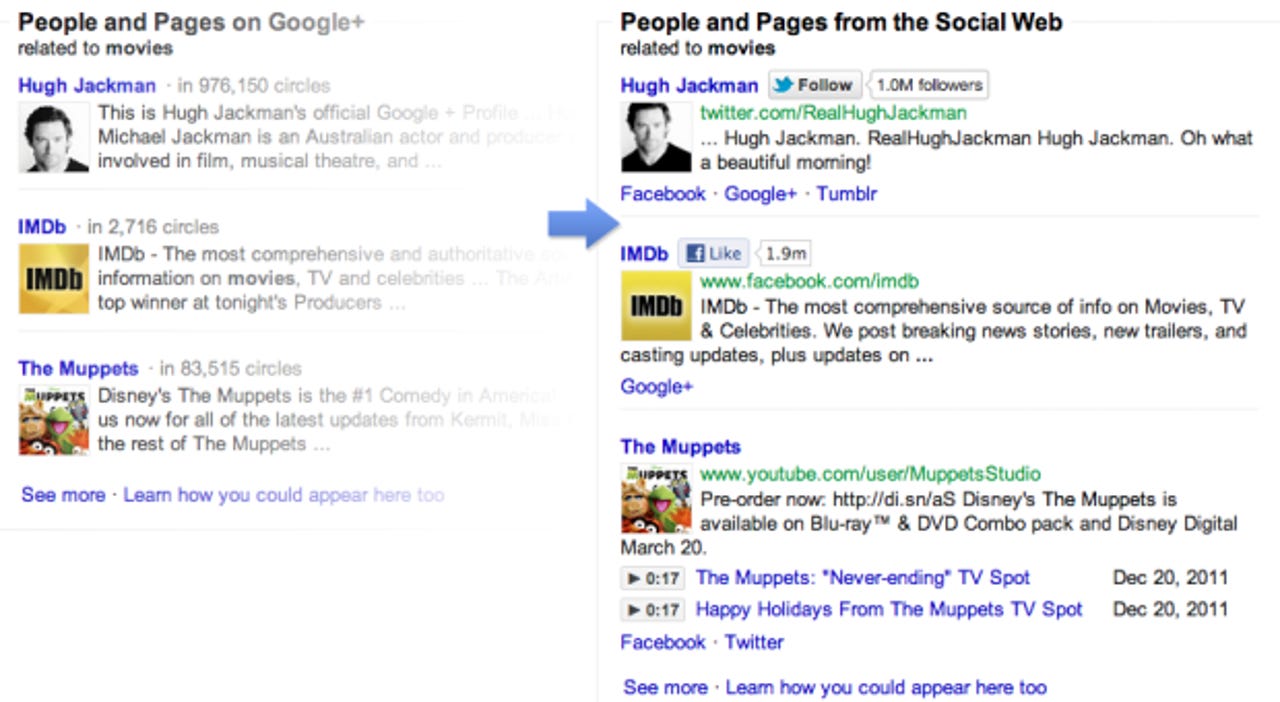Facebook's 'don't be evil' Google fix now a Firefox add-on

Yesterday, Blake Ross, Facebook's product director and co-founder of Firefox, and Facebook engineers Tom Occhino and Marshall Roch released a bookmarklet called "don't be evil" (a jab at Google's informal motto) that tweaks Google's newly launched Search plus Your World (SPYW) feature to surface results from all social networks, not just Google+.
Firefox developer Dietrich Ayala has released a Mozilla Firefox add-on based on the original script; you can download it yourself from Mozilla's Add-Ons webpage (note: it hasn't been reviewed by Mozilla yet).
Here's the official description:
Packages the bookmarklet from http://focusontheuser.org/ into an add-on, so that the changes are applied to all Google search result pages.
The original bookmarklet requires that you click on it after you submit your query to Google. The new results include links to CrunchBase (not exactly a social network, but okay), Facebook, Flickr, Foursquare, FriendFeed, GitHub, Google+, LinkedIn, MySpace, Quora, Stack Overflow, Tumblr, Twitter, instead of just Google+. Once you've visited google.com and clicked on the bookmarklet once, it will continue to work for subsequent queries until you click away from google.com. Next time you visit google.com, however, you have to click the bookmarklet again.
The group released the code as open source in the hopes that someone would turn the bookmarklet into a browser extension so that you don't have to click it every time you visit google.com. I found a Chrome extension yesterday and today was pointed to the Firefox add-on.
You can view the JavaScript code yourself over at focusontheuser.org/dontbeevil/script.js. The bookmarklet, extension, and add-on thus work the same way, since they're all based on the same script; the last two are just more automatic versions of the first.
As such, these four paragraphs describing the bookmarklet are also accurate for the extension and add-on:
If Google's search engine decides that it's relevant to surface a Google+ page in response to a query where Google+ content is hardcoded, the tool searches Google for the name of the Google+ page and identifies the social profiles within the first ten pages of Google's search results (top 100 results). The ones Google ranks highest, regardless of what social network they are from, replace the previous results that would only be from Google+.
To be clear: the tool not only reorders the search engine results, but also the results of the promotional Google+ boxes on the right side of the results, as well as the autocomplete results that feature Google+ accounts when you type into the search box. In Google language these three are known as: People & Pages results, Google+ Sitelinks, and Google+ Suggestions In Autocomplete. The bookmarklet even shows profile pictures, which are pulled directly from Google. The tool enters the address of the new social result into Google's Rich Snippets Testing Tool and uses the information that Google provides. In other words, Google is only showing images for Google+ results, even though it has images from many other services.
By the way, the tool might not work for you because SPYW hasn't been rolled out to everyone yet. Google has pushed out the new social features on google.com to a percentage of U.S. users. If you don't see any of the Google+ social results on Google yet, you do not have the feature yet, so you can't use the "don't be evil" tool.
Google says it requires permission from other social networks like Facebook and Twitter to deeply crawl their websites in order to provide a consistent experience with SPYW. Since Facebook and Twitter don't give Google permission to their users' private content, SPYW mainly features Google+ content, and neither social network is very pleased about this.
The point of the tool is to show Google is lying; the search giant already indexes all public information on social networks, and there's no reason why it can't use that data as well. The tool never accesses any server or API outside of google.com. The information being provided has already been indexed and ranked by Google.
The bookmarklet was originally released for Chrome, Firefox, and Safari (Internet Explorer and Opera users are out of luck). I'm still waiting to hear about a Safari extension. Curiously, neither the Chrome extension I already wrote about nor the Firefox add-on I'm writing about now are posted over at focusontheuser.org/extensions.php, although there is a different Chrome extension listed there.
See also:
